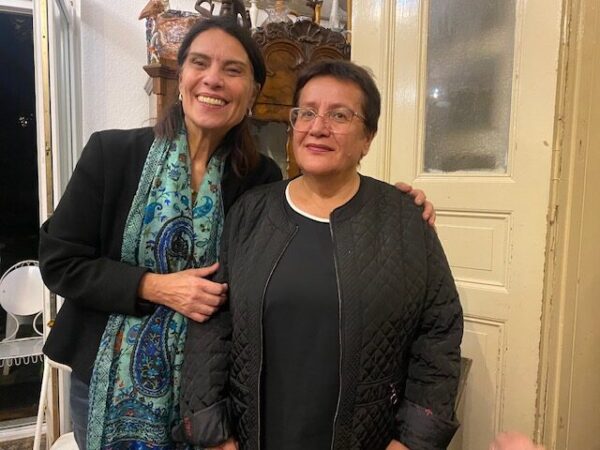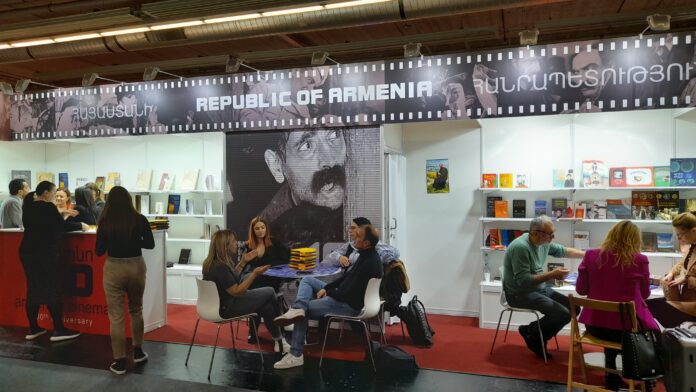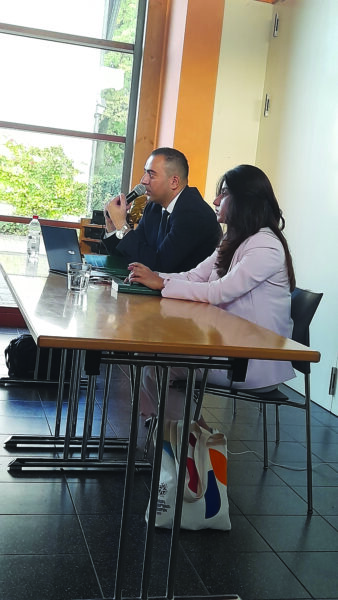FRANKFURT — Despite crises at home and abroad, several representatives of Armenia’s rich literary culture and publishing enterprises travelled to Frankfurt for this year’s book fair, which took place from October 18 to 27. Receiving visitors at the large Armenian stand were Arevik Ashkharoyan, founder of ARI Literary and Talent Agency, Zara Hakobyan, from the National Library of Armenia, and Ani Musheghyan, researcher and librarian from the Komitas Museum-Institute. And featured in the Armenian presence were two authors, both women: Lusine Kharatyan and Susanna Harutyunyan.
The Armenian stand displayed several new publications, including an anthology presenting 13 emerging authors from as many European countries, with excerpts from their works, in the original language and English translation. The European Union Prize for Literature (EUPL) was established in 2009 by the “Creative Europe programme” of the European Union, which issued the anthology. The aim is to support the book sector in Europe, in its diversity and competitiveness, devoting special attention to up-and-coming authors from countries and language cultures one finds less frequently in bookstores.
Thirteen authors of fiction were nominated for the prize by literary associations in their respective nations, among them Lusine Kharatyan, for A Syrian Affair. Her first novel was An Oblique Book (2017), which was followed by a collection of short stories, A Dead End Forget-me-not, short-listed for the EUPL in 2021. For her second novel, featured here, she received a grant from the Armenian Ministry of Education, Science, Culture, and Sport. A cultural anthropologist and translator, Kharatyan has received degrees in public policy, demography and history/sociocultural anthropology from Minnesota University, Cairo Demographic Center, and Yerevan State University, respectively.
Her newest novel presents the story of three Armenian women recruited by an American group to conduct research on the Armenian communities in Syria and Lebanon. The narrative explores the accounts provided by Armenians they interview in both countries, while all the time the trio are followed by Syrian intelligence (Mukhabarat) who think they might be American or Israeli agents. In its report, PEN Armenia praised the novel for its literary excellence, as well as its insights into pre-crisis Syria, and the depiction of cultural-political diversity of the diaspora communities, the role of women in the post-Soviet context, and the challenges facing women researchers in patriarchal societies. It is also a thriller, full of suspense until the end. The chapter excerpted is titled, The Emplaced, translated by Nazareth Saferian, it presents the three women, Shushan, Ester, and Astghik, in their first encounter with Armenian representatives in Damascus.

Susanna Harutyunyan, who was personally present in Germany, is already a well-known author. Her ninth novel, Ravens before Noah, published in the centenary year of the genocide, won the Presidential Prize for Literature in 2016, and is familiar to readers of the Mirror-Spectator (https://mirrorspectator.com/2021/05/20/haratunyans-ravens-before-noah-towards-an-armenian-baroque/). Now the celebrated novel has appeared in a German translation. Harutyunyan was a featured author on October 21 at the book fair, where she read passages in Armenian, which translator Susanna Yeghoyan read in German. A day earlier the she had been the guest of the Armenians in Munich; introduced by Board member Sona Krüger, she presented her novel, again in the original and translation.
Following the book fair, Harutyunyan travelled to Berlin, where a large audience welcomed her at the Literary Salon of Ekke Maass, who runs the German Caucasian Society. The event was dedicated to Armenia. Dr. Tessa Hofmann delivered a report on the situation in Artsakh, then introduced Harutyunyan. German-Armenian actress Bea Ehlers-Kerbekian delivered readings from the newly translated novel. In a review of the book, Hofmann compared Harutyunyan’s treatment of the Ottoman genocide to the prose of authors from the diaspora in America and Europe, defining her innovation in depicting the genocide of Western Armenians as double victimization, that is, including the guilt of Soviet Armenian lawyers and police officers. This refers to crimes committed during the Stalin era, against members of the clergy and their families, and against intellectuals who sought refuge in the South Caucasus. She also stressed the author’s intimate knowledge of the history, myths, and customs of her home country.









